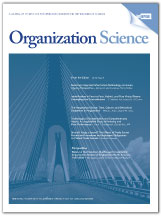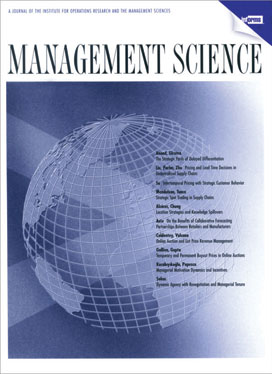Academic articles
Practitioner articles
Working papers
Books
Book chapters
Case studies
Other publications
Subject(s)
Economics, politics and business environment; Ethics and social responsibility; Management sciences, decision sciences and quantitative methods; Marketing
Keyword(s)
self-control, pro-social behavior, altruism, dictator game
Volume
7
Journal Pages
304–315
Subject(s)
Strategy and general management
Keyword(s)
status, network analysis, graphs, tournaments, performance
Two competing predictions about the effect of status on performance appear in the organizational theory and sociological literatures. On the one hand, various researchers have posited that status elevates levels of performance. This line of work emphasizes tangible and intangible resources that accrue to occupants of high-status positions and thus pictures status as an asset. On the other hand, a second line of work emphasizes complacency and distraction as deleterious processes that plague occupants of high-status positions and thus portrays status as a liability. Which of these two approaches best characterizes the actual performance of individuals in a market setting? And are these views in any way reconcilable? In this article, we summarize the two views and test them in two empirical settings: the Professional Golf Association (PGA) and the National Association for Stock Car Racing (NASCAR). Using panel data on the PGA Tour, we model golfers' strokes from par in each competition as a function of their status in the sport. Using similar data on NASCAR's Winston Cup Series, we model drivers' speed in the qualifying round as a function of their status in the sport. We find curvilinear effects of status in both empirical settings. Performance improves with status-until a very high level of status is reached, after which performance wanes. This result not only concurs with the view that status brings tangible and intangible resources, but also provides empirical support for the contention that status fosters dispositions and behaviors that undermine performance.
© 2012 INFORMS
Volume
23
Journal Pages
416–433
Subject(s)
Economics, politics and business environment
Keyword(s)
Incentives, structural change, moral hazard, professional sports
JEL Code(s)
D82, J41, L14, M52
Volume
232
Journal Pages
258–278
ISSN (Online)
2366-049X
ISSN (Print)
0021–4027
Subject(s)
Economics, politics and business environment
Keyword(s)
productivity, information technologies, organizational practices, panel data
JEL Code(s)
O33, D22, D24
Volume
12
Journal Pages
1–39
Subject(s)
Economics, politics and business environment
Keyword(s)
telecommunications, access regulation, unbundling, investment
JEL Code(s)
C51, L59, L96
We provide evidence of an inherent trade-off between access regulation and investment incentives in telecommunications by using a comprehensive data set covering 70+ fixed-line operators in 20 countries over 10 years. Our econometric model accommodates: different investment incentives for incumbents and entrants; a strategic interaction of entrants' and incumbents' investments; and endogenous regulation. We find access regulation to negatively affect both total industry and individual carrier investment. Thus promoting market entry by means of regulated access undermines incentives to invest in facilities-based competition. Moreover, we find evidence of a regulatory commitment problem: higher incumbents' investments encourage provision of regulated access.
With permission of the University of Chicago Press
Volume
55
Journal Pages
189–216
Subject(s)
Economics, politics and business environment
Keyword(s)
market definition, shopping centre, externalities, characteristics approach
Volume
7
Journal Pages
421–431
Subject(s)
Strategy and general management
Keyword(s)
corporate social responsibility, competitive strategy, challenger brand, affective trust
This research builds on the complementary corporate social responsibility (CSR) literatures in strategy and marketing to provide insight into the efficacy of CSR as a challenger's competitive weapon against a market leader. Through an investigation of a real world CSR initiative, we show that the challenger can reap superior business returns among consumers who had participated in its CSR initiative, relative to those who were merely aware of the initiative. Specifically, participant consumers demonstrate the desired attitudinal and behavioral changes in favor of the challenger, regardless of their affective trust in the leader, whereas aware consumers' reactions become less favorable as their affective trust in the leader increases. Furthermore, participation, unlike mere awareness, transforms the nature of the consumer-challenger relationship from a transactional one to a communal, trust-based one.
© 2011 INFORMS
Volume
57
Journal Pages
1528–1545
ISSN (Online)
1526-5501
ISSN (Print)
0025–1909
Subject(s)
Technology, R&D management
Keyword(s)
innovation, commercialization, patents, multi-invention context
Volume
53
Journal Pages
47–79
Subject(s)
Economics, politics and business environment
Keyword(s)
competition policy, merger control, market definition, state aid, regulation
Volume
38
Journal Pages
287–314
Subject(s)
Marketing
Keyword(s)
CSR, marketing, corporate identity, consumer-company identification, identity alignment, marketing strategy
The paper integrates and builds on extant thinking in corporate marketing and CSR to provide an identity-based conceptualization of CSR. Based on this, it positions CSR as an optimal managerial tool for promoting alignment between multiple corporate identities (e.g., internal, external), which ultimately leads to key benefits for the company.
With permission of Emerald
Volume
45
Journal Pages
1353–1364



